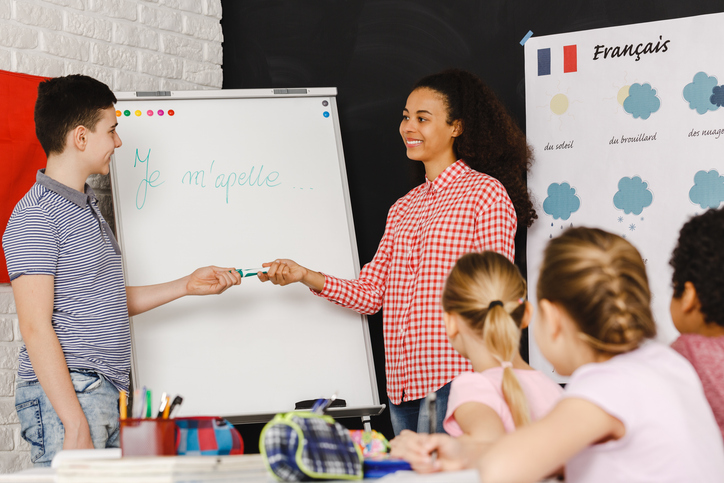

In today’s interconnected world, multilingualism in education is gaining increasing recognition for its numerous benefits and challenges for students. By immersing themselves in a multilingual environment, students acquire valuable communication skills, enhance their cognitive abilities, and foster a greater understanding of diverse cultures. For schools, however, it is important to implement a curriculum that works alongside national requirements while being easily adaptable to their local context.
A significant challenge lies in ensuring that schools effectively integrate foreign language learning with other subjects to provide a holistic understanding of the world. Collaborative efforts between English as a Second Language (ESL) and homeroom teachers are crucial for demonstrating the relevance of foreign languages beyond the classroom and connecting them to real-world challenges and global issues.
Integrating foreign language learning with other subjects
At Heritage International School in the Republic of Moldova, they teach in the native languages of Russian and Romanian, with English as a second language. Teachers implement cross-reference research to identify the common learning goals across their own national curriculum and ICA’s International Curriculum. From this starting point, the school is able to offer a combined curriculum that meets the objectives of both curricula.
To develop students’ ESL competencies, the school administration decided to offer units from the International Curriculum that inspired children’s curiosity and motivated them to discover more about the world.
These units help to guide learning and encourage learners to ask themselves relevant questions, using their research, investigation and collaboration skills to find answers to achieve a common goal. They learn to apply their language skills from the very first unit where they study with ‘Brainwave.’ While students learn about the brain and how it works, they develop language skills using vocabulary specific to their age. This enables them to talk about their knowledge and express their understanding of the theme.
Embracing multilingualism for a global future
The school found the project to be a major success, with children becoming curious about research and eager to present their findings and share their learning with their peers. Students enjoyed helping each other and praising each other’s work; teachers were pleased to see the children celebrating not only the result but also the learning process. Another achievement is that they realize that the theme connects learning across subjects, including ESL, Romanian, Russian, Mathematics, and Science—this is the moment they understand that all these pieces are parts of a whole.
We always recommend that learners share their multilingual experiences with their family at home, using their newly acquired English skills to demonstrate their knowledge and understanding with others.
Exploring identity through poetry
At United Lisbon International School, where students represent over 60 different nationalities, the topic of identity gains even more relevance as cherishing students’ backgrounds becomes key in fostering students’ engagement and interest in learning.
Through the exploration of poems by diverse authors such as Tom Leonard, Moniza Alvi, Grace Nicols, and George Ella Lyon, students went on a journey of self-discovery. They learned to view themselves and others through different perspectives, understanding that identity is not static but continually evolving. They reflected on their own identities, and considered how their interactions with others shape who they are and how they exist in the world.
One of the most impactful aspects of the project was the inclusion of bilingual poems, which allowed students to explore the unique characteristics of different languages and how they reflect different cultural identities. Why did the authors choose to mix two languages in their poems? What impact did it have on the reader? Why did Tom Leonard write phonetically in a Glaswegian dialect? By considering these questions, students were able to recognize the value of multilingualism and how it can contribute to a richer, more diverse and equitable society.
The culmination of this unit saw the students at Lisbon International School create their own poem video, with students bringing together everything they had learned about poetic features, their spoken English, video-making skills, and their awareness of the importance of their mother tongue and cultural background. This is testament to the students’ growth and understanding, showcasing their ability to express themselves creatively and successfully reflect on their own identities.
Summary
Implementing a successful multilingual curriculum requires careful planning and collaboration. Schools must ensure that their curriculum aligns with national requirements while remaining adaptable to local contexts. Integrating foreign language learning with other subjects is crucial for demonstrating the relevance of language skills beyond the classroom.
By embracing multilingualism and implementing effective strategies, schools can empower students to become global citizens, equipped with the skills and knowledge needed to thrive in today’s world.
Learn more from our webinar ‘Embracing Multilingualism as a Key: A Journey Towards Linguistic Inclusion’. Click here to watch for free.
Case Studies:
- Heritage International School: This school successfully integrated foreign language learning with other subjects by creating cross-reference research opportunities. Students were motivated to discover the world through engaging units that connected different disciplines.
- United Lisbon International School: By exploring diverse poetry, students at this school gained a deeper understanding of their own identities and the value of multilingualism. The creation of a video poem showcased their growth and ability to express themselves creatively.
Key Takeaways:
- Multilingualism enhances student development and global citizenship.
- Effective integration of foreign languages into the curriculum is crucial.
- Collaboration between teachers and a focus on real-world relevance are essential.
- Student-centred learning and opportunities for creative expression foster deeper understanding.
Marcela Polo is a Middle and High School English teacher at United Lisbon International School, Portugal.
Inga Corlateanu is an English Second Language teacher at Heritage International School, Republic of Moldova.





